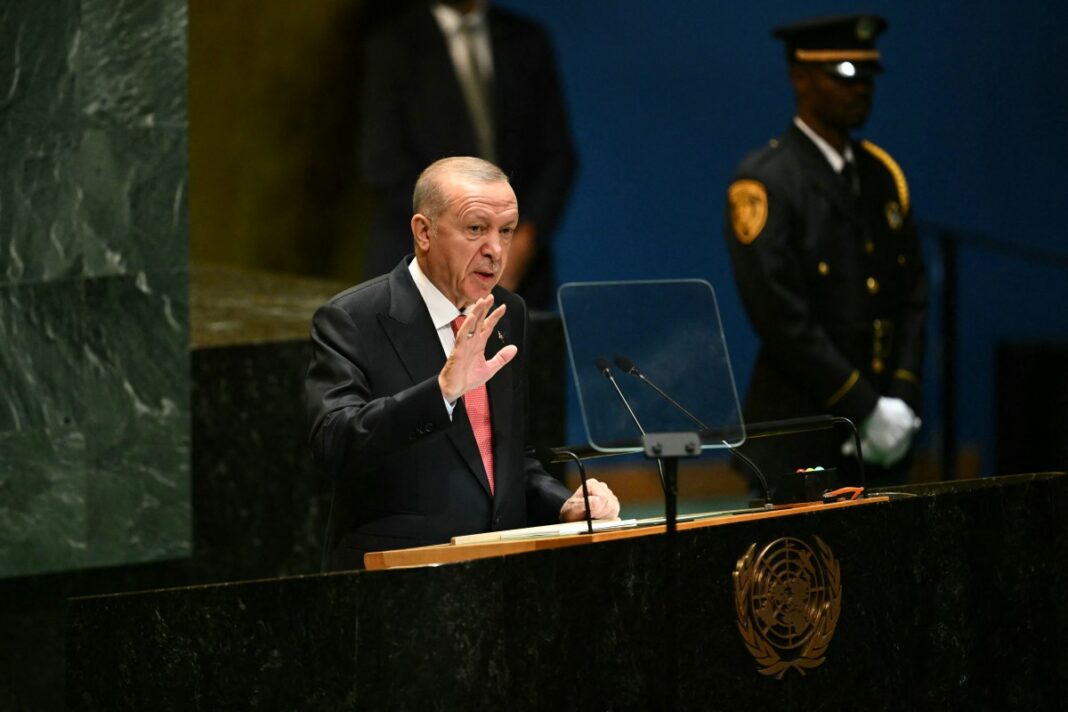As Israel’s war on Gaza continues into its second year, Turkey has intensified its public condemnation, with President Recep Tayyip Erdoğan accusing Israeli Prime Minister Benjamin Netanyahu’s government of committing genocide, while reports show that trade between the two countries remains active, though largely routed through third-party channels, including Palestine.
Following Hamas’ October 7, 2023 attack on Israel, which led to the death of approximately 1,200 Israelis, Israel launched an intense military campaign on Gaza. This bombardment, which has killed more than 40,000 Palestinians — mostly women and children, according to Gaza’s health ministry — has drawn widespread international condemnation. Israel stands accused of genocide at the International Court of Justice (ICJ), following a case brought by South Africa in late 2023.
Turkey, one of Israel’s most vocal critics, has strongly denounced Israel’s actions in Gaza.
In May 2024 the Turkish government announced a halt in exports to Israel after a public outcry over Israel’s military actions in Gaza.
Erdoğan has repeatedly accused Israel of “genocidal behavior” and compared the Netanyahu administration’s actions to those of Nazi Germany.
However, while official data show a near cessation of direct exports to Israel, trade with Palestine has surged to unprecedented levels, raising questions about whether goods are being rerouted to Israel.
Data from the Turkish Exporters’ Assembly (TİM) show a significant increase in Turkish exports to Palestine.
According to TİM’s data, Turkish exports to Israel plummeted by 100 percent in September, with the value of goods sent to Israel falling from $460.3 million in September 2023 to just $1,200 in September 2024. Year-to-date figures show a 65.3 percent drop in exports to Israel, from $4.07 billion in the first nine months of 2023 to $1.41 billion during the same period in 2024.
In contrast Turkish exports to Palestine have surged by more than 1,000 percent in the same period. In September 2024 alone, Turkey exported $167.7 million worth of goods to Palestine, compared to $13.8 million in September 2023 — a 1,113 percent increase. Year-to-date exports to Palestine rose from $91.3 million in 2023 to $571.2 million in 2024, a 525.8 percent jump.
This drastic increase in trade with Palestine, particularly in sectors such as steel, cement, textiles and electronics, has led to speculation that Turkish goods may be entering Israel under the guise of exports to Palestine. Palestine, with its limited infrastructure and economy, would struggle to absorb such large quantities of goods, fueling suspicions that most of these exports are being rerouted to Israel.
Palestinian customs, which are largely controlled by Israel, allow goods to flow into Israel without violating the official trade ban. Shipping documents often list Palestine as the recipient, allowing Turkish goods to enter Israeli markets without directly breaching the embargo. This trade dynamic has been criticized by opposition figures and trade analysts who argue that the Turkish government is maintaining a facade of solidarity with Palestinians while continuing business with Israel.
“Despite public statements, trade has not ceased,” said investigative journalist Metin Cihan. “Palestine is being used as a gateway for Turkish goods to Israel, especially in key industries such as construction materials and textiles.”
Citing recent data from the global shipping tracker Marinetraffic, Cihan revealed that 88 Turkish vessels docked in Israeli ports in the months after Turkey announced a ban on trade with Israel, with at least four more currently en route.
Cihan, citing industry experts, said goods labeled as bound for Palestine are entering Israel after passing through Israeli-controlled customs points. Once in Israeli ports, the goods are delivered to Israeli businesses. This trade arrangement appears to be facilitated by intermediaries, who charge commissions to reroute Turkish goods into Israel while officially documenting them as Palestinian imports.
Erdoğan’s rhetoric against Israel has intensified in recent months, with the Turkish president claiming that Israel’s expansionist aims could eventually target Turkey. In a speech to the Turkish Parliament in September 2024, Erdoğan claimed that Netanyahu’s administration harbors ambitions to extend control over parts of Anatolia.
This rhetoric marks a sharp departure from the tone of bilateral relations just a year ago. In September 2023 Erdoğan met with Netanyahu on the sidelines of the United Nations General Assembly in New York, where the two leaders discussed potential energy cooperation.
However, the escalation of Israel’s military actions in Gaza, which have devastated much of the territory and left its civilian population in dire need, has caused relations to deteriorate rapidly.
Yet, despite the political fallout, Turkey and Israel remain economically interdependent. Diplomatic ties have not been fully severed, and key trade agreements, such as a 2022 aviation deal, remain in effect. Intelligence cooperation between the two countries also continues behind the scenes, according to security sources.
Critics have accused Erdoğan of exploiting the situation for domestic political gain, using anti-Israel rhetoric to rally nationalist support amid economic challenges in Turkey.
The ongoing war in Gaza has led to rising tensions across the Middle East, with Israel facing mounting international criticism, particularly over its actions in Gaza. As the ICJ proceeds with the genocide case, Turkey’s public stance remains sharply critical of Israel, but its behind-the-scenes trade dealings suggest a relationship shaped by economic pragmatism.
